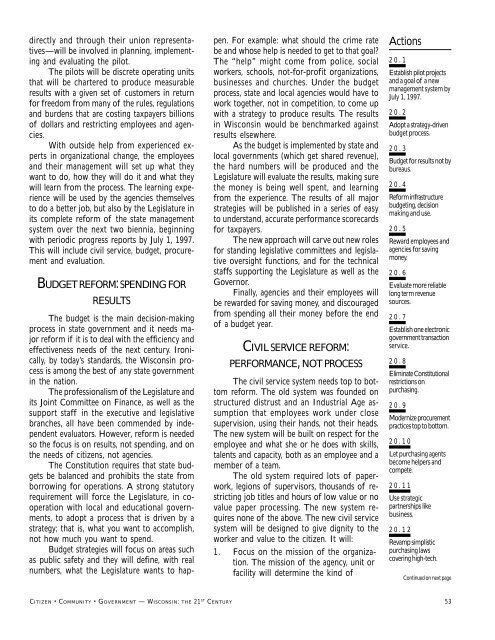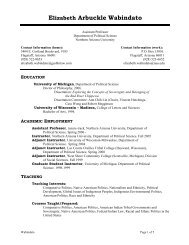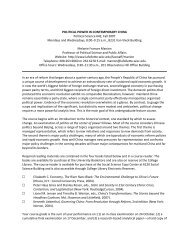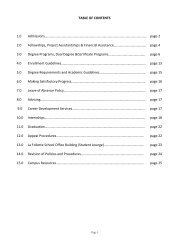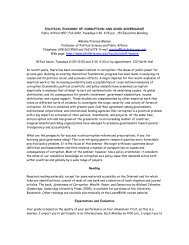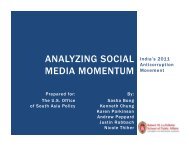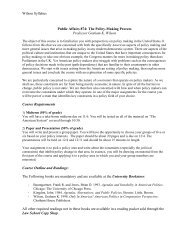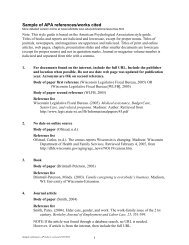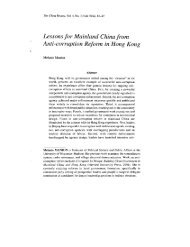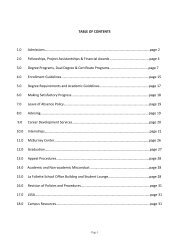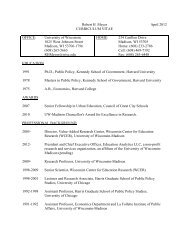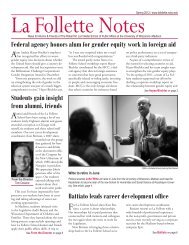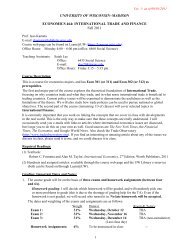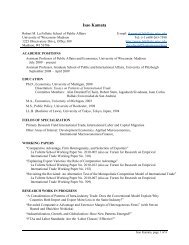SAVE Commission's findings - La Follette School of Public Affairs ...
SAVE Commission's findings - La Follette School of Public Affairs ...
SAVE Commission's findings - La Follette School of Public Affairs ...
Create successful ePaper yourself
Turn your PDF publications into a flip-book with our unique Google optimized e-Paper software.
directly and through their union representatives—will<br />
be involved in planning, implementing<br />
and evaluating the pilot.<br />
The pilots will be discrete operating units<br />
that will be chartered to produce measurable<br />
results with a given set <strong>of</strong> customers in return<br />
for freedom from many <strong>of</strong> the rules, regulations<br />
and burdens that are costing taxpayers billions<br />
<strong>of</strong> dollars and restricting employees and agencies.<br />
With outside help from experienced experts<br />
in organizational change, the employees<br />
and their management will set up what they<br />
want to do, how they will do it and what they<br />
will learn from the process. The learning experience<br />
will be used by the agencies themselves<br />
to do a better job, but also by the Legislature in<br />
its complete reform <strong>of</strong> the state management<br />
system over the next two biennia, beginning<br />
with periodic progress reports by July 1, 1997.<br />
This will include civil service, budget, procurement<br />
and evaluation.<br />
BUDGET REFORM: SPENDING FOR<br />
RESULTS<br />
The budget is the main decision-making<br />
process in state government and it needs major<br />
reform if it is to deal with the efficiency and<br />
effectiveness needs <strong>of</strong> the next century. Ironically,<br />
by today’s standards, the Wisconsin process<br />
is among the best <strong>of</strong> any state government<br />
in the nation.<br />
The pr<strong>of</strong>essionalism <strong>of</strong> the Legislature and<br />
its Joint Committee on Finance, as well as the<br />
support staff in the executive and legislative<br />
branches, all have been commended by independent<br />
evaluators. However, reform is needed<br />
so the focus is on results, not spending, and on<br />
the needs <strong>of</strong> citizens, not agencies.<br />
The Constitution requires that state budgets<br />
be balanced and prohibits the state from<br />
borrowing for operations. A strong statutory<br />
requirement will force the Legislature, in cooperation<br />
with local and educational governments,<br />
to adopt a process that is driven by a<br />
strategy; that is, what you want to accomplish,<br />
not how much you want to spend.<br />
Budget strategies will focus on areas such<br />
as public safety and they will define, with real<br />
numbers, what the Legislature wants to happen.<br />
For example: what should the crime rate<br />
be and whose help is needed to get to that goal?<br />
The “help” might come from police, social<br />
workers, schools, not-for-pr<strong>of</strong>it organizations,<br />
businesses and churches. Under the budget<br />
process, state and local agencies would have to<br />
work together, not in competition, to come up<br />
with a strategy to produce results. The results<br />
in Wisconsin would be benchmarked against<br />
results elsewhere.<br />
As the budget is implemented by state and<br />
local governments (which get shared revenue),<br />
the hard numbers will be produced and the<br />
Legislature will evaluate the results, making sure<br />
the money is being well spent, and learning<br />
from the experience. The results <strong>of</strong> all major<br />
strategies will be published in a series <strong>of</strong> easy<br />
to understand, accurate performance scorecards<br />
for taxpayers.<br />
The new approach will carve out new roles<br />
for standing legislative committees and legislative<br />
oversight functions, and for the technical<br />
staffs supporting the Legislature as well as the<br />
Governor.<br />
Finally, agencies and their employees will<br />
be rewarded for saving money, and discouraged<br />
from spending all their money before the end<br />
<strong>of</strong> a budget year.<br />
CIVIL SERVICE REFORM:<br />
PERFORMANCE, NOT PROCESS<br />
The civil service system needs top to bottom<br />
reform. The old system was founded on<br />
structured distrust and an Industrial Age assumption<br />
that employees work under close<br />
supervision, using their hands, not their heads.<br />
The new system will be built on respect for the<br />
employee and what she or he does with skills,<br />
talents and capacity, both as an employee and a<br />
member <strong>of</strong> a team.<br />
The old system required lots <strong>of</strong> paperwork,<br />
legions <strong>of</strong> supervisors, thousands <strong>of</strong> restricting<br />
job titles and hours <strong>of</strong> low value or no<br />
value paper processing. The new system requires<br />
none <strong>of</strong> the above. The new civil service<br />
system will be designed to give dignity to the<br />
worker and value to the citizen. It will:<br />
1. Focus on the mission <strong>of</strong> the organization.<br />
The mission <strong>of</strong> the agency, unit or<br />
facility will determine the kind <strong>of</strong><br />
Actions<br />
20.1<br />
Establish pilot projects<br />
and a goal <strong>of</strong> a new<br />
management system by<br />
July 1, 1997.<br />
20.2<br />
Adopt a strategy-driven<br />
budget process.<br />
20.3<br />
Budget for results not by<br />
bureaus.<br />
20.4<br />
Reform infrastructure<br />
budgeting, decision<br />
making and use.<br />
20.5<br />
Reward employees and<br />
agencies for saving<br />
money.<br />
20.6<br />
Evaluate more reliable<br />
long term revenue<br />
sources.<br />
20.7<br />
Establish one electronic<br />
government transaction<br />
service.<br />
20.8<br />
Eliminate Constitutional<br />
restrictions on<br />
purchasing.<br />
20.9<br />
Modernize procurement<br />
practices top to bottom.<br />
20.10<br />
Let purchasing agents<br />
become helpers and<br />
compete.<br />
20.11<br />
Use strategic<br />
partnerships like<br />
business.<br />
20.12<br />
Revamp simplistic<br />
purchasing laws<br />
covering high-tech.<br />
Continued on next page<br />
CITIZEN • COMMUNITY • GOVERNMENT — WISCONSIN: THE 21 ST CENTURY 53


